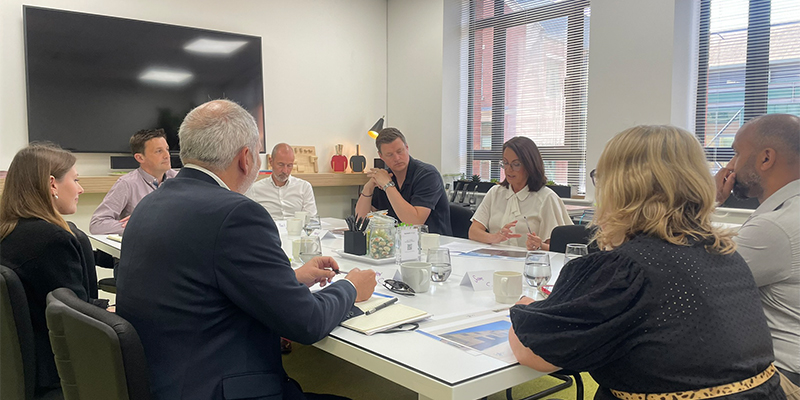Comment
Love it or Level it: What we learned about the future of repurposing vs. redevelopment from our roundtable with Leonard Design
On 13 May, a group of curious minds met to debate how we successfully regenerate towns and cities. To repurpose or redevelop – to love it, or level it – we brought together a range of expert perspectives to explore how policy and surrounding considerations should be carefully weighed in the balance. Director, Andrea Arnall reflects on the session and shares her commentary.
At the roundtable in Nottingham, we were joined by co-chair Leonard Design, alongside Igloo, Places for People, Nottingham City Council, AtkinsRéalis and Homes England.
I was also joined by Associate Director, Sustainability and ESG, Debbie Harvey at the roundtable.
The context of a complex choice
This is an increasingly hot topic – not just post the infamous M&S decision on London’s Oxford Street, but as we all grapple with an increasingly complex set of planning and wider considerations and much greater awareness of the impact of our actions on people and the planet.
So, how do we develop responsibly and ensure we get the balance right between retrofit and retention and redevelopment?
We brought together those delivering regeneration, market commentators, sustainability professionals, architects and planners to reflect on the challenges moving forward, how we must adapt, and what new measures of success might look like.
Policy meets politics meets place
We shared images of buildings and places we thought of under the banner of love it or level it. The Broadmarsh shopping centre in Nottingham, old Birmingham Central Library, The Pattern Shop Newcastle and the Tube Works Birmingham. The group advocated for redevelopment in the right circumstances and equally found joy in a selection of excellent retention / adaptation schemes.
There certainly wasn’t a one-size-fits-all solution to the developments, and for those willing to show bravery and leadership, it was felt that a longer-term view can create value beyond the balance sheet. We debated how a decision can’t be based on buildings alone and the value of places and spaces in shaping regeneration proposals. We reflected on how what we want from towns and cities is changing and the need to deliver new homes urgently weighing heavily in the balance.
We debated how politics in local government is influencing decisions and a continued lack of resource in the public sector making delivery of any regeneration slow progress. Fragmented ownership continues to pose a significant challenge to placemaking.
We discussed how demolition is becoming much more controversial with national and local lobby groups becoming better informed and more active. We debated how important it is to be alive to local sentiment, to understand the needs and wants of the community and to find common ground.
We discussed how retrofit and adaptation can be more complex and challenging than redevelopment, often requiring substantial effort over a long period of time. However, we also reflected on such approaches delivering greater ‘rewards’ over the longer-term, including a point of difference in the end product, which might be difficult to capture on a balance sheet.

Balancing carbon and the case for change
There was a consensus that we are to expect more focus on embodied and operational carbon impacts, both in terms of emerging planning policy and as an assessment tool to compare redevelopment versus retention schemes, and that better information was a good thing that should lead to more informed decisions.
We reflected on past schemes and how the current climate inevitably makes the case for redevelopment more challenging and increasingly complex. However, we also took away that there is absolutely a place for redevelopment in the right circumstances and where the benefits justify it. We reflected on the guidance in NPPF which continues to provide scope for redevelopment, made with the intention that the effects on climate change are considered as fully as possible and assessed via the planning system, being properly weighed alongside the substantive benefits of a scheme. The upshot is that we will continue, rightly so, to see an increased focus on embodied carbon and the effects of development on climate change more widely. Local planning policy outside of London is catching up and planning applications will need to be clear and upfront on this issue.
Thank you to our participants for their valued contributions and to Leonard Design for hosting and co-chairing the session.
Participants:
John Morgan – Leonard Design
Samantha Veal – Igloo Regeneration
Mark Battin – Places for People
Paul Seddon – Nottingham City Council
Andrew Prickett – AtkinsRéalis
Ragu Sittambalam – Homes England
Andrea Arnall, Debbie Harvey – Turley
Please contact Andrea Arnall to continue the conversation on this topic.
For advice on sustainability and carbon, or for information on the UK Net Zero Carbon Buildings Standard and related guidance from the UK Green Building Council (UKGBC), get in touch with Debbie Harvey.
19 June 2025
Key contacts
You may also be interested in
Showcase
Repurposing our urban centres
Comment
Towards the New London Plan
News
16 June 2025
Turley appoints first Placemaking Lead
We have appointed Stephen Taylor to the newly created role of Placemaking Lead as we accelerate growth in this key strategic ...
